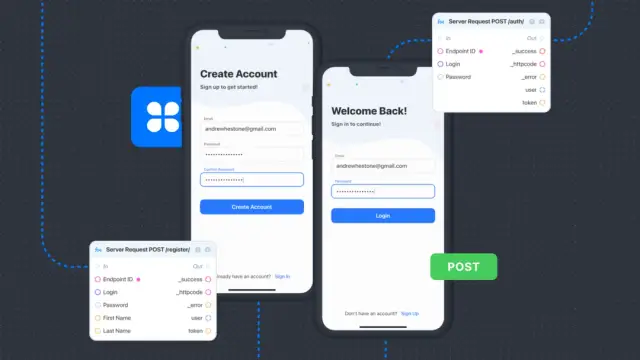How Zerocode Platforms are Democratizing Software Development
Explore how zerocode platforms are transforming the software development industry by making app creation more accessible to non-programmers. Learn the core features, benefits, and popular examples of these platforms including AppMaster.io.

What are Zerocode Platforms?
Zerocode ( no-code) platforms are a transformative technological innovation designed to help users build web, mobile, and backend applications without the need for programming skills. These platforms simplify the app development process through the use of intuitive graphical user interfaces, drag-and-drop components, and visual development tools. By eliminating the need for writing code, zerocode platforms democratize software development, making it accessible to users without a technical background.
The term "zerocode" refers to the absence of coding required by users of these platforms. Zerocode platforms generate all necessary code automatically, while users focus on designing the application's components and features. This reduces the barrier of entry for app creation and opens up the field to a wider range of individuals and organizations.
The Democratization of Software Development
Zerocode platforms have brought profound change to the software development industry. Previously, app development demanded expert knowledge of programming languages, frameworks, tools, and best practices. This imposed significant barriers for individuals and businesses aiming to create custom software solutions. With the advent of zerocode platforms, the playing field has been leveled, allowing more users to engage in software development. Democratization of software development has several key implications:
- Reduced reliance on developers: Zerocode platforms empower non-technical users to create applications, decreasing the need for specialized developers. Businesses can build and maintain their apps with a smaller development team, reducing the burden of hiring, training, and retaining skilled developers.
- Faster development and innovation: Due to their visual interface and built-in components, zerocode platforms significantly accelerate the app development process. This allows businesses to bring their ideas to market more quickly, reducing the time required for prototyping, testing, and iteration.
- Increased diversity and creativity: By making software development accessible to a broader range of users, zerocode platforms encourage creative thinking and innovation. With people from various backgrounds and perspectives engaged in app creation, it's more likely that unique ideas and features will be developed, resulting in a richer ecosystem of applications.
- Lower costs: With reduced reliance on skilled developers and faster development times, the cost of creating and maintaining applications is notably less compared to traditional development approaches. This allows businesses of all sizes to allocate resources more effectively, while also enabling small businesses and startups to build custom software solutions without breaking the bank.

Core Features of Zerocode Platforms
Zerocode platforms boast a range of features that differentiate them from traditional software development approaches. Some of the most common features include:
- Graphical User Interface (GUI): Zerocode platforms provide an intuitive GUI, enabling users to design application components visually. Users can arrange elements such as buttons, text fields, and images without writing any code.
- Drag-and-Drop Components: A wide array of pre-built components is available in most zerocode platforms, streamlining the process of building apps. Users can simply drag and drop these elements onto their canvas, creating an app structure without the need for coding expertise.
- Visual Development Tools: Zerocode platforms offer visual tools to design application layouts, workflows, and user interactions. Users can create and manage the app's overall architecture using built-in templates, customizable components, and visual connectors.
- Automatic Code Generation: One of the key features of zerocode platforms is their ability to generate code automatically, based on user inputs and design decisions. This allows users to focus on app design and functionality, while the platform handles the backend complexities.
- API Integrations: Zerocode platforms typically provide an extensive library of pre-built API integrations or plugins, allowing users to connect their application with various third-party services. Integrating with external services enhances the app's capabilities, without requiring the user to write extensive code themselves.
Zerocode platforms have emerged as a viable alternative to traditional software development. Their core features enable non-technical users to build custom applications quickly and efficiently, democratizing the software development process, and paving the way for a more inclusive industry.
Benefits of Zerocode Platforms for Businesses
Zerocode platforms have rapidly gained popularity among businesses due to the numerous advantages they offer. They not only simplify the software development process but also empower non-developers to take part in creating digital solutions for their enterprises. Below are some key benefits of incorporating zerocode platforms in businesses:
Cost and Time Savings
Zerocode platforms significantly reduce development costs and time. They enable users to build applications without programming expertise, resulting in a more cost-effective and faster process. Since many templates and components are provided with these platforms, businesses can quickly create custom applications with minimal investment.
Reduced Dependency on Programmers
The use of zerocode platforms reduces the dependency of businesses on development teams and programmers. No longer do organizations need an extensive technical team to build applications; non-programmers can create solutions through intuitive interfaces and by leveraging pre-built components. This helps businesses become more agile and have greater control over their software development projects.
Increased Innovation
With the simplicity and accessibility offered by zerocode platforms, employees from various departments can contribute their ideas and insights into the application development process. This cross-functional collaboration brings fresh perspectives to application design, fostering innovation and helping businesses create more user-centric solutions.
Simplified App Maintenance and Updates
Zerocode platforms offer more efficient app maintenance and update processes. Since these platforms generate code automatically and allow updates through visual tools, it becomes easier for businesses to incorporate changes and keep their applications up-to-date. As technology evolves, companies can quickly adapt their applications to meet new requirements and user expectations.
Improved Scalability
Many zerocode platforms are designed to provide scalable solutions that can grow with a business. As the application gains traction and the user base expands, these platforms can handle the increased traffic and accommodate new feature requests. This allows businesses to enhance their applications without worrying about performance or architectural constraints.
Popular Zerocode Platforms and AppMaster.io
Several zerocode platforms have emerged in the market, each with its unique feature set and target audience. Some popular examples include OutSystems, Workato, and Retool. However, AppMaster.io stands out as one of the most comprehensive and powerful no-code platforms in the industry.

AppMaster.io enables users to create backend, web, and mobile applications using visual tools and drag-and-drop components. Users can visually create data models, define business logic through Business Processes, and design UI elements for both web and mobile applications. This level of functionality accelerates the application development process and makes it accessible to a broader range of users. Here are some key features of AppMaster.io that set it apart from other zerocode platforms:
- Generates real applications: With every project update, AppMaster.io generates applications from scratch, eliminating technical debt and ensuring that the applications can scale efficiently.
- Offers executable binary files and source code: AppMaster.io allows users with higher-tier subscription plans to access binary files and source code for their applications, enabling them to host these on-premises.
- Compatible with PostgreSQL: AppMaster.io applications can work with any PostgreSQL-compatible databases as their primary database, allowing for high levels of scalability and performance.
Challenges and Limitations of Zerocode Solutions
Though zerocode platforms have undeniably revolutionized software development, they also come with certain challenges and limitations. Businesses should be aware of these factors before fully embracing zerocode solutions:
Limited Customizability
While zerocode platforms offer numerous pre-built components and templates, they may not always provide the level of customization required for specific business use-cases. Organizations with unique, complex requirements may find it difficult to create solutions that match their exact needs using off-the-shelf components.
Performance Concerns
Performance can be a concern, particularly when using zerocode platforms to build resource-intensive applications. As the number of users and features grows, some platforms may struggle to provide a seamless, high-performance experience. Businesses need to ensure that their chosen platform can adequately handle the intended application's scale and complexity.
Reliance on Platform Provider
Adopting a zerocode solution means that businesses become heavily reliant on the platform provider for ongoing support and maintenance. Should the provider encounter issues or cease operations, organizations may find themselves in a difficult position, with limited control and access to the underlying code.
Security, Data Privacy, and Compliance
Ensuring the security, privacy, and regulatory compliance of applications built using zerocode platforms is vital. Businesses must perform due diligence to understand the platform's security model and the measures in place to protect data. They also need to ensure that the platform meets the required industry regulations and standards.
Despite these challenges, zerocode platforms continue to transform and democratize software development, making it more accessible and efficient for businesses of all sizes. By selecting the right platform, considering the above limitations, and planning a strategic approach, organizations can reap the benefits of these advanced tools to create sophisticated web, mobile, and backend applications.
The Future of Zerocode Platforms
As the impact of zerocode platforms becomes more evident, we can expect the market to continue growing rapidly in the coming years. They are already revolutionizing the way businesses and individuals approach software development, but the potential for further advancements is vast. In this section, we will explore the future trends, developments, and potentials that zerocode platforms have in store.
Increased Advancements in AI and Machine Learning
The role of artificial intelligence (AI) and machine learning within zerocode platforms is likely to grow in importance. As AI engines become more sophisticated, they will enable the automation of more complex tasks and assist users in defining their application requirements more effectively. The integration of AI and machine learning into the development process can vastly improve the efficiency of creating applications and provide users with valuable real-time feedback.
Greater Integration with Other Tools and Services
To remain competitive and maximize their utility, zerocode platforms will increasingly integrate with other essential tools and services in the software development ecosystem. These may include popular project management, database management, analytics, CRM, and marketing automation tools. As a result, users can expect a more streamlined workflow that combines the best of multiple tools while minimizing the need to switch between disparate systems manually.
Growth in Pre-built Components, Templates, and Resources
As the popularity of zerocode platforms grows, so does the availability of pre-built components, templates, and resources. These can be easily implemented by users, speeding up the development process and ensuring a high-quality user experience. Moreover, as users create and contribute custom elements, the possibilities for customization will continue to expand, allowing for an even greater degree of personalization while adhering to standard industry practices.
Fostering Collaboration Between Technical and Non-technical Teams
Zerocode platforms democratize software development by breaking down barriers between technical and non-technical users. As a result, we can expect a future where such platforms enable and foster more effective collaboration between teams with diverse skill sets. This can lead to innovative new products and better alignment between the technical and business requirements of an application.
Greater Adoption by Businesses of All Sizes
As the advantages of zerocode platforms become more widely recognized, businesses of all sizes and from various industries are expected to adopt them as part of their software development strategies. Smaller businesses, in particular, will benefit significantly from the cost savings and ease of use associated with these platforms. By democratizing software development, we can expect to see a more diverse environment of applications emerging in the market, driving innovation in numerous sectors.
Increased Emphasis on Security, Privacy, and Compliance
As the adoption of zerocode platforms grows, there will be a growing need to address security, privacy, and compliance concerns. Platform providers will need to ensure that their solutions meet the increasingly stringent data protection, industry-specific regulation, and security requirements for businesses operating in different domains. By providing comprehensive security features and addressing regulatory compliance issues, zerocode platforms can instill greater trust and encourage widespread adoption among users.
In conclusion, zerocode platforms like AppMaster.io are driving a significant shift in the software development industry by making the process more accessible and democratizing it for businesses and individuals alike. The future of zerocode platforms appears bright, and as they continue to evolve, we can expect to see even greater advancements that will further change the way we develop and deploy applications. Our ability to create innovative and useful software will only strengthen due to the increasing capabilities of these powerful, yet accessible, development tools.
FAQ
A zerocode platform is a software platform designed to enable users to create web, mobile, and backend applications without writing any programming code. It simplifies app development by providing graphical user interfaces, drag-and-drop components, and visual development tools that can be used without the need for programming expertise.
Zerocode platforms democratize software development by making the process of app creation more accessible to non-programmers. They enable businesses and individuals to build their own apps at a reduced cost and in less time. This leads to a greater diversity of applications being developed and a faster pace of innovation.
Some common features of zerocode platforms include graphical user interfaces, drag-and-drop components, visual development tools, automatic code generation, and API integrations. These features aim to simplify app development and reduce the need for programming expertise.
Zerocode platforms offer numerous benefits to businesses, including cost and time savings, reduced dependency on programmers, increased innovation, and simplified app maintenance and updates.
Popular zerocode platforms include AppMaster.io, OutSystems, Workato, and Retool. AppMaster.io is a powerful no-code tool that allows users to visually create data models, business logic, API endpoints, and UI designs for web, mobile, and backend applications.
Some challenges and limitations associated with zerocode platforms include limited customizability, performance concerns, reliance on the platform provider for ongoing support, and potential issues with security, data privacy, and compliance.
AppMaster.io differentiates itself with its comprehensive, integrated development environment that generates executable binary files and source code for hosting on-premises. Its approach eliminates technical debt, ensures scalability, and makes application development 10x faster and 3x more cost-effective for a wide range of customers.
The future of zerocode platforms includes ongoing advancements in AI and machine learning, increased integration with other tools and services, growth in the availability of pre-built templates and components, and growing adoption by businesses of all sizes to democratize their software development processes.





